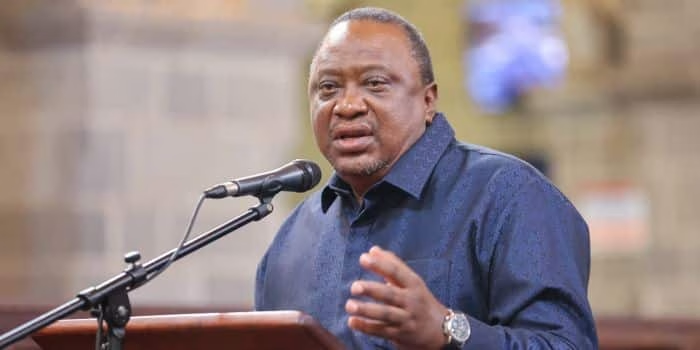When former President Uhuru Kenyatta stood before mourners at the memorial of his close friend, Frank Ireri, few expected a personal revelation. In a rare moment of candour, he spoke of facing “health challenges” that had tested his strength over the past year. His words were brief, but they sent a ripple across the country — stirring compassion, speculation, and deep reflection among Kenyans.

Uhuru’s Revelation: A Moment of Vulnerability
In his speech, Uhuru said, “In the last year and a good part of this year, I’ve had my own challenges — health and otherwise.” He added that his dead friend, who was battling cancer, encouraged him so much about his health issue and gave him advice on the same. It is at this point that Kenyans started speculating that he is also battling cancer.
It was the first time the former president had publicly admitted to struggling with his health. Though he offered no details, his tone was subdued, reflective, and human — a sharp contrast to the authoritative image many still associate with his years in power.
For a man who once carried the weight of a nation, this openness was seen by many as an act of humility. His remarks were not just about illness; they hinted at mortality, struggle, and the universal reality that even power cannot shield one from life’s frailty.
Kenyans Show Support and Empathy
Almost immediately after the video of Uhuru’s speech went viral, social media platforms were filled with prayers, blessings, and words of encouragement. On X (formerly Twitter), hashtags like #PrayForUhuru and #GetWellSoonPresident trended for hours.
One user wrote:
“No matter our political differences, we can all agree that health is above politics. May God restore his strength.”
Another added:
“Mungu amponye. Uhuru is human like all of us — we wish him healing and peace.”
On Facebook, Kenyans shared old photos of the former president, many remembering him as a smiling leader who loved laughter. The general mood was empathetic, with messages like:
“Atapona in Jesus’ name,”
“Let’s pray for our former president. We have lost too many leaders already.”
Even critics softened their tone, choosing empathy over politics. Political analyst Makau Mutua praised Uhuru’s honesty, saying, “His openness about his health is a powerful reminder of the fragility of life. Let’s wish him strength and long life.”
Not Everyone Was Sympathetic
Yet, amid the wave of goodwill, a section of Kenyans took the opportunity to revisit Uhuru’s legacy.
On Reddit and TikTok, discussions emerged questioning why sympathy seemed to overshadow accountability. One user wrote:
“I wish him recovery, but I can’t forget how his government left the economy in shambles. Health doesn’t erase history.”
Others pointed out that his illness, if true, should spark introspection about Kenya’s healthcare system — one that many ordinary citizens struggle to access.
“Leaders only talk about health when it affects them personally,” one Kenyan lamented. “Maybe this will make them understand what ordinary people go through.”
For some, Uhuru’s revelation became less about him and more about the broken public health infrastructure that millions face daily.
The Speculation and Silence
As empathy poured in, rumours also multiplied. Some blogs claimed Uhuru was battling cancer; others alleged he had been hospitalized abroad. None of these claims were confirmed.
Neither Uhuru’s family nor his office has released an official medical statement, leaving Kenyans to piece together assumptions from his public appearances — shorter hair, a visibly thinner frame, and a more reserved demeanor.

However, responsible media outlets urged caution, reminding the public that without official confirmation, such claims remain speculation.
What is certain is that Uhuru’s appearance and tone have changed — perhaps signaling a private battle he is not yet ready to fully share.
What This Moment Says About Kenyans
The reaction to Uhuru Kenyatta’s health concerns says more about Kenya’s social conscience than about politics. In a country often divided by tribal lines and political allegiances, this moment reminded many that compassion can transcend ideology.
It also exposed a maturing digital culture. Unlike past incidents where rumours about leaders’ health sparked mockery or political taunting, most Kenyans this time chose restraint. Even those who once criticised Uhuru found themselves offering prayers rather than blame.
There’s also a generational undertone — a growing belief that leaders, too, deserve empathy when they show vulnerability. Kenyans are learning to separate leadership critique from basic human sympathy.
Legacy and Humanity Intertwined
Uhuru Kenyatta’s health revelation has reopened old questions about what it means to be a former head of state in Kenya. Beyond politics, he remains a father, a husband, and a citizen. For many, his moment of honesty humanised him in a way few political speeches ever could.
It also reflects a broader truth: Kenya’s leaders, past and present, are not immune to the very systems they once shaped. When illness strikes, power offers little comfort; what remains is humanity — the prayers, the concern, and the hope of recovery.
Conclusion: A Lesson in Empathy
As Kenyans continue to debate and speculate, one thing is clear — Uhuru Kenyatta’s brief admission has touched a nerve. Whether one supports or opposes him, his words remind the nation of a simple truth: health is the great equalizer.
In a time of rising political tension and economic struggle, Kenyans have shown they can still pause to wish someone well — even someone they once criticised. And perhaps, in that shared moment of compassion, the country found a rare sense of unity.
More stories https://www.whispers.co.ke/
Follow us https://www.facebook.com/
